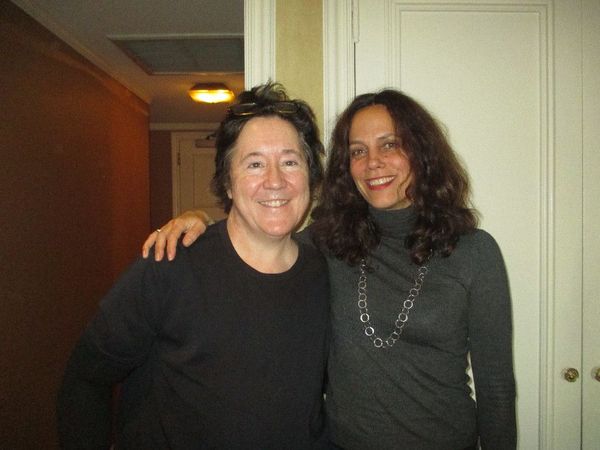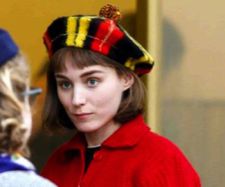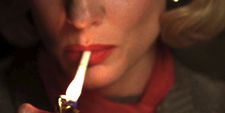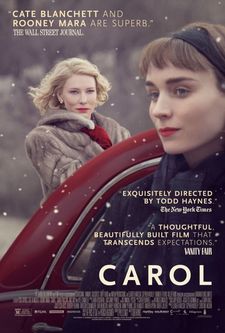 |
| Carol producers Christine Vachon and Elizabeth Karlsen Photo: Anne-Katrin Titze |
On the morning of the press conference for Todd Haynes' Carol, starring Cate Blanchett and Rooney Mara, I met up with fellow First Time Fest juror Christine Vachon of Killer Films and Number 9 Films' Elizabeth Karlsen. Christine and Elizabeth executive produced the disturbing Mrs. Harris, starring Annette Bening and Ben Kingsley, directed by Phyllis Nagy, who is the screenwriter for Carol.
![Cate Blanchett as Carol: "She [Cate] was attached to it before Todd and I came on board."](/images/newsite/Carol (Cate Blanchett)_225.jpg) |
| Cate Blanchett as Carol: "She [Cate] was attached to it before Todd and I came on board." |
Anne-Katrin Titze: Let's start with food. I noticed that Carol eats mashed potatoes, eats vegetables, eats no meat. Is Carol a vegetarian?
Christine Vachon: That never occurred to us!
Elizabeth Karlsen: Is there not meat on that plate?
AKT: I don't think so. I took note of that.
Elizabeth: She orders squid, doesn't she, in the restaurant?
AKT: She's not a vegan.
Elizabeth: I don't think the word vegan was around in 1952 [it was coined in 1944].
Christine: She doesn't order squid. She orders spinach!
Elizabeth: Doesn't she say "I'll have the calamari?"
Christine: No! Or if she does, we cut it out.
AKT: Only because of Christine's eggs did I think of asking you about this.
 |
| Rooney Mara as Therese: "We just talked to various people and Rooney was top of the list." |
Elizabeth: We never really thought about it and never had this discussion.
Christine: Maybe Todd knows.
Elizabeth: At the dinner with the parents?
AKT: She eats mashed potatoes.
Elizabeth: I remember the props people cutting meat.
AKT: I thought it was done on purpose - that even there Carol was before her time. That's part of her attraction.
Christine: You could be right.
AKT: The smoking, I am sure, was discussed. There is a woman who hides her smoking from her husband and there's the comment that we all have something to hide. When Carol drives Therese to the station, we aren't sure if her addiction to cigarettes is to blame or something else.
 Carol (Cate Blanchett)_225.jpg) |
| Therese with Carol: "The women were expected to turn up immaculately dressed just for going out shopping." |
Elizabeth: There is that great line - "Just when you thought things couldn't get any worse, you find you'd run out of cigarettes," which really speaks about so many things that are happening at that moment in the film. It also makes the audience laugh, because so many people recognize that moment from their smoking days.
Christine: Right. Or it could be anything.
AKT: Any addiction, really. The original title of the novel was The Price Of Salt and later Patricia Highsmith changed it to Carol.
Elizabeth: It was changed when the book was re-published in 1992. Which was when Highsmith decided she would assume her own name, and not Claire Morgan, because it was originally published under a pseudonym. And there's various explanations as to why it was published under a pseudonym depending on what you read and whom you speak to. It was in 1992 when she said, okay let's re-publish the novel and I will take authorship and let's call it Carol because Price of Salt is a little bit of an obscure title.
AKT: What was the explanation for The Price Of Salt?
Elizabeth: I think it has to do with Lot's Wife.
 |
| Carol's cigarette: "Just when you thought things couldn't get any worse …" |
Christine: Lot's Wife turns into a pillar of salt. It's a little obscure and I didn't know what it meant. And Todd didn't know what it meant.
Elizabeth: I think it must be Lot's Wife - also salt was expensive, an expensive commodity.
AKT: It's also domestic. A housewife knows the price of salt.
Elizabeth: That's very true.
AKT: I thought, the film also shows you the price of nostalgia. Everything looks so stunningly beautiful. And then you see the rules that came with it. Can you speak about the issue of nostalgia?
Elizabeth: I think that perhaps there is nostalgia for audiences who look and say, oh I remember that piece of music by Perry Como or I remember my mother wearing a dress like that or I remember my grandfather having those cars. But I think that also what's important in the film is there is an urgency to it and there is a universality to it. I think that some of the themes in the movie around love, around parenting, marriage, desire, are actually themes that cross the temporal boundaries. I think an audience might be nostalgic in the way they view…
 Carol (Cate Blanchett)_225.jpg) |
| Harge (Kyle Chandler) with Carol |
Christine: See, I don't find the film nostalgic at all because nostalgia to me is about sentimentality. Having a sentimentality for an age gone by. And I don't think the movie plays on that. I think what Todd is really good at is making period films that are absolutely of the moment.
AKT: I didn't see that sentimentality you describe, either. The nostalgia for me is in the details, the pretzel-like iron work of the subway grate at the start, for example. That pang of nostalgia that comes for a second when objects speak of the past. But then, the nostalgia here comes with the "morality clause." You can't have one without the other.
Elizabeth: I think what's great when you look at that Christmas scene, with that beautiful tree and Cate as Carol sitting on the floor wrapping the presents and Therese [Rooney Mara] playing the piano - you can see that's what you're saying that's what audiences might want to take from that moment. But Christine is saying, Todd making it so of the moment and so urgent, of course, Harge [Kyle Chandler] comes through the front door. Any desire to be nostalgic in a sentimental way is just - that rug is just completely pulled away from you.
AKT: Exactly. In a way, Highsmith's Strangers On A Train is also very beautiful and shows very ugly modes of behaviour at the same time. You did not film Carol in New York?
 |
| Carol US poster |
Christine: In Cincinnati.
AKT: How did you turn Cincinnati into such a fantastic New York?
Christine: New York in the Fifties is long gone and we knew that in order to recreate it in New York would be prohibitively expensive. You know, shooting a period film, means you're virtually dressing every single thing you see. Whether it's this room or what you're wearing - everything has to be adjusted. In New York, it would have meant adjusting from the ground up, basically.
Elizabeth: It was just double the budget. My partner [Stephen Woolley] and I had shot a film in Cincinnati 27 years ago which was called A Rage In Harlem, which was actually set in Fifties Harlem. It just didn't occur to me really that a city wouldn't have changed dramatically, architecturally in 27 years. But when the New York budget came in and we were just banging our head against the wall, we just started googling images and thinking, wow, that looks pretty good, and then went onto the film commissioner website and found out that they also had a tax rebate which was incredibly well structured and stable and beneficial.
So when we went to scout it with Todd and the production designer, Todd could not believe what was before his eyes. For us as producers it was just a perfect storm of creative and financial imperatives that enabled this film to be made. Judy Becker, the designer, was given such a fantastic foundation to build from because the city really had not changed. The core, the downtown of central Cincinnati is architecturally so well-preserved.
Christine: The city itself was very happy to have us there so they kind of went this extra mile that I think it's hard to quantify exactly how it added to our production value but it did. You know, if a storefront didn't want to let us paint their awning, suddenly the commissioner was in there and they did. If they were reluctant to let us close down traffic on these two streets, suddenly the commissioner went in and there we were.
_225.jpg) |
| On Cincinnati for Carol: "Judy Becker, the designer, was given such a fantastic foundation to build from …" |
AKT: The interior of the department store looks terrific, although it felt a bit hostile too. As though the two women are already encircled by hostility. I don't know if I would want to shop there.
Christine: I would want to shop there.
Elizabeth: It sort of shows a type of social incarceration. The women were expected to turn up immaculately dressed just for going out shopping. Voiceover dictates to them, there's a kind of role playing forced upon them. Maybe it's that the department store highlights that element of the way that those women, Therese and Carol are trapped.
AKT: Of course I would like to have a look at the toys and the train set, maybe not at the doll "Betsy, who cries and wets herself." I loved about the film how all the details made so much sense. The nails! Cate Blanchett's nails are of the Fifties. No woman today would get her nails done that way. Cate Blanchett was attached from early on, no?
Christine: She was attached to it before Todd and I came on board.
AKT: Rooney Mara came afterwards?
Elizabeth: Rooney came after when we all got together with the casting director Laura Rosenthal and we just talked to various people and Rooney was top of the list. Actually, I had approached Rooney previously and she passed because she had just finished Girl With The Dragon Tattoo and she just could not face working again right afterwards. And it was just again, the timing was perfect, we went back to her and she said yes.
AKT: She looks like Jean Simmons in Carol.
Christine: Yeah. Jean Seberg, Jean Simmons, Audrey Hepburn.
AKT: I saw that you are going to be working with Wash Westmoreland. Wash told me before the Oscars last year that he and Richard [Glatzer] had been working on a project about religion. Is that the one?
Christine: It's not that one. This one is about Colette. There're a few up their sleeve. I suppose you could say there's some religion in Colette - in some ways.
AKT: You are both involved with the Colette picture?
Elizabeth: Yes, we are. That's going to be our third feature. We've done shorts together but this is our third feature.
Christine: Re-team.
AKT: I am already looking forward to it.
On Sunday, November 22, in celebration of 20 Years of Killer Films, co-founders Christine Vachon and Pamela Koffler will participate in a Q&A at the Walter Reade Theater following the 3:00pm screening of Kimberly Peirce’s Boys Don't Cry, starring Hilary Swank and Chloë Sevigny. Todd Haynes: The Other Side of Dreams runs from November 18 through November 29 at the Film Society of Lincoln Center.
Carol opens in the US on November 20 and in the UK on November 27.





















